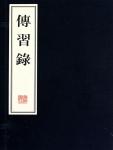Chapter 1 foreword
Wang Yangming, formerly known as Yun, later changed his name to Shouren, courtesy name Bo'an, was born in Yuyao, Zhejiang.Mr. Yang Ming was born in a family of officials in 1472 AD, and his distant ancestor was Wang Xizhi, a great calligrapher in the Eastern Jin Dynasty, who died in 1529 AD.Because he lived in seclusion in Yangming Cave, Kuaiji Mountain, Shaoxing, and later founded Yangming Academy, he is known as Mr. Yangming in the world.Later generations generally call him Wang Yangming, and his theory is known as "Yangming School".After his death, Ming Mu Zongzhao posthumously named Wencheng, so he was also called Wang Wencheng.Wang Yangming has achieved quite a lot in his life. He is not only proficient in Confucianism, Buddhism, and Taoism, but also able to lead the army in battle. He is a rare all-round great Confucianist in Chinese history.
Wang Yangming was born in the middle of the Ming Dynasty. At that time, academics were in decline, class struggle continued to intensify, the ruling group became increasingly decadent, and peasant uprisings continued one after another.Cheng-Zhu Neo-Confucianism, which has gone through 400 years and has become rigid, can't do anything about it.Wang Yangming tried to turn the tide and save people's hearts by inventing "the study of body and mind", advocating the teaching of conscience, and cultivating the benevolence of the unity of all things.
It was against this background that it came into being.
Generally speaking, it is Wang Yangming's collection of quotations and letters on learning, which is similar to that of Confucianism. The word "Chuanxi" comes from the phrase "Chuanbuxihu" in Chinese.Wang Yangming's philosophical thoughts are mainly reflected in his "University Questions" and other works, among which the most typical one is an important material for studying Wang Yangming's thoughts, especially the development of his psychology.In form, it broke the theoretical framework of Cheng-Zhu Neo-Confucianism, re-established the ideological system of mind with the basic categories of "mind is reason", "unity of knowledge and action", and "reaching conscience", and reformed and innovated in ontology and methodology Neo-Confucianism in the Song and Ming Dynasties emphasized subject consciousness and independent spirit in content, opposed superstitious authority, relying on books, and had a strong sense of common people, thus forming a unique educational thought.Appreciated and respected by some progressive social reformers in later generations.His thoughts broke through the dull situation that Chinese thought circles had been monopolized by Cheng Zhu Neo Confucianism for hundreds of years, and had a huge and far-reaching influence on philosophy and literature in the late Ming Dynasty, which continued into modern my country and extended to East Asia. , and its influence has gradually penetrated into Southeast Asian countries, North America and Europe.We can see the value and charm of his thought.Taking East Asia as an example, in Japan, Yangming School was accepted by a large number of thinkers at the end of the Shogunate, which promoted the Meiji Restoration Movement in Japan.In North Korea, Yangmingism also spread secretly and influenced many thinkers.In South Korea, which was in the period of economic boom, Yangmingology was regarded as a model of spirituality.
It was compiled and published successively during Wang Yangming's lifetime and after his death. It is divided into three volumes: upper, middle, and lower. It contains Wang Yangming's main philosophical system and basic propositions. A classic of psychology.Although Yangming School is an idealistic thought with the limitations of its time and class, when Zhu School was in decline, it advocated "mind is reason" and "unity of knowledge and action", and developed the Confucian inner sage way to the extreme , its ideological value is very high, and its enlightenment to future generations is profound and extensive.Even in modern society, it is still timeless and shining with wonderful light.This is the unique charm of the classic.
In view of the fact that most of the language is relatively obscure and difficult to understand, on the basis of authentically presenting the wisdom of the sages, the book adopts the title style, and divides Xu Ai's quotations and seven-point letters into subsections to explain, with obvious themes; plus a clear and smooth translation , the incisive interpretation, let readers read it, and suddenly feel that they can't put it down.I sincerely hope that this book can enable readers and friends to read the classics, unlock wisdom, and guide life while enjoying the profound and profound Chinese studies.

